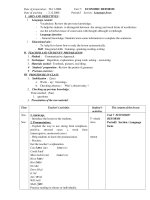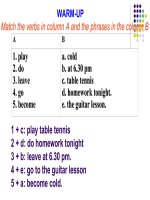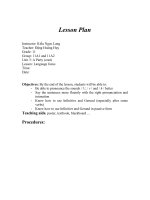Unit 3 Language focus
Bạn đang xem bản rút gọn của tài liệu. Xem và tải ngay bản đầy đủ của tài liệu tại đây (86.36 KB, 5 trang )
English 12 Unit 1 & 2 – Review
A. Pronunciation: Word Stress
I. Two syllable word
1 Stress on first syllable
rule example
exception
Most 2-syllable nouns PRESent, EXport, CHIna, TAble
machine, eVENT
Most 2-syllable adj PRESent, SLENder, CLEVer, HAPpy
Verbs end with OW, EN, Y, EL, ER, LE, ISH to open, to follow, to hurry, to struggle, to flatter, to finish
2 Stress on last syllable
rule example
Most 2-syllable verbs to preSENT, to exPORT, to deCIDE, to beGIN
II. Three or > three syllable words
1. General rule: Stress 3rd syllable - counting backwards
Example celebrate, curriculum, to unify...
Exception to develop, imagine, banana
2. Special case:
- Stress on second syllable from end if words end with -ic, -sion, -tion
Example GRAPHic, geoGRAPHic, geoLOGic, teleVIsion, revelation
- Stress on the third syllable from end if words end with -cy, -ty, -phy, -gy, -al
Example deMOcracy, dependaBIlity, phoTOgraphy, geOLogy, CRItical, geological
- Stress on the following syllable: ADE, OO, OON, EE, EEN, EER, ESE, ISE, IZE, AIRE, SELF
Example pickaboo, millionaire, cocoon, analyze, engineer, themselves
3. Compound words (words with two parts)
- Compound nouns, the stress is on the first part
Example BLACKbird, GREENhouse
- Compound adjectives, the stress is on the second part
Example bad-TEMpered, old-FASHioned
- Compound verbs, the stress is on the second part
Example to underSTAND, to overFLOW
B. Grammar: Reported speech
I. Statements
Do not change the tense if the introductory clause is in Simple Present (e. g. He says). Note, however, that you
might have to change the form of the present tense verb (3rd person singular).
Example “I speak English.”
He says that he speaks English. (no backshift)
He said that he spoke English. (backshift)
You must change the tense if the introductory clause is in Simple Past (e. g. He said). This is called backshift.
Example He said, “I am happy.” He said that he was happy.
Tense
Direct Speech Reported Speech
Simple Present
S + V (es/s) S + Ved
Present Progressive
S + am/ is / are + Ving S + was/were + Ving
Simple Past
S + Ved
S + had + P
II
Present Perfect
S + have/ has + P
II
Past Perfect
S + had + P
II
Past Progressive
S + was/were + Ving
S + had been Ving
Present Perfect Progressive
S + have/ have been Ving
Past Perfect Progressive
S + had been Ving
Future
S + will/ shall + V S + would + V
Conditional type I
If S + V (es/s), S + will/ shall + V If S + Ved, S + would + V
Conditional type II and III
If S + Ved, S + would + V
If S + had P
II
, S + would have P
II
No Change
The verbs could, should, would, might, must, needn’t, ought to, used to do not normally change.
Created by Mai Phuong Page 1 of 2
English 12 Unit 1 & 2 – Review
Example: He said, “She might be right.” He said that she might be right.
II. Questions in Reported Speech
For pronouns, tenses and place / time expressions see statements in reported speech.
Besides, note that instead of ‚that‘ you use the interrogative. If there is no interrogative, use whether/ if
Direct Speech Reported Speech
statement He said: “She lives in London.“ He said that she lived in London
question with interrogative He asked:” Where does she live?“ He asked where she lived.
question without interrogative He asked: “Does she live in London?“
He asked whether she lived in London.
He asked if she lived in London.
It is also important that you use an indirect question in reported speech, i.e. after the interrogative or
whether /if you continue the sentence as if it were a statement (subject-verb etc.). The auxiliary verb do is not used in
indirect questions.
Example: He asked: “Where does she live?“ He asked where she lived.
III. Requests in Reported Speech
For pronouns and place / time expressions see statements in reported speech.
Tenses are not relevant for requests – simply use ‚to‘ + infinite verb.
Example: She said, “Say hello to your mum.“ She asked me to say hello to my mum.
For negative requests, use ‚not to‘ + infinite verb.
Example: He said, “Don’t give up, Bob.“ He advised Bob not to give up.
IV. Reported speech with gerund:
* Suggest:
“Shall we go for a swim now?”
She suggested going for a swim then.
“What about playing tennis?”
He suggested playing tennis.
* Admit:
“I know I am wrong”
He admitted being wrong.
“I’ve broken the mirror”
He admitted breaking the mirror.
* Insist on:
“I really need a break after lunch”
The boy insisted on having a break after lunch.
“Please come on! Lend me some money”
The woman insists on lending her some money.
* Apologize for:
“Sorry! I’ve hurt you”
He apologized for hurting me.
“Sorry I’m late”
She apologized for being late.
Accuse sb of
Dream of
Congratulate sb on sth
look forward to
prevent sb from
deny
thank sb for
think of
Blame sb for (doing) sth
Blame sth on sb
Warn sb against sth
Change of time expression
today
that day next year
the following year
now
then tomorrow
the next day / the following day
yesterday
the day before here
there
… days ago
… days before this
that
last week
the week before these
those
Created by Mai Phuong Page 2 of 2









